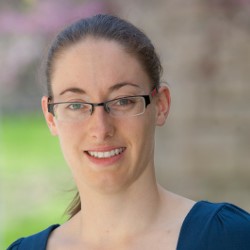Dr. Michelle Paquette came to UMKC in January 2011 as a Postdoctoral Research  Associate, and is now a Research Assistant Professor of Physics. She received an external grant in 2014 (a Young Investigator Award from the Defense Threat Reduction Agency), and has been working with a group for three years on a project for Intel. She is also involved with the Graduate Writing Initiative, where she helps to plan new resources for graduate student writing on campus, as well as the Project SEED program, which places financially disadvantaged high school students in research labs for the summer.
Associate, and is now a Research Assistant Professor of Physics. She received an external grant in 2014 (a Young Investigator Award from the Defense Threat Reduction Agency), and has been working with a group for three years on a project for Intel. She is also involved with the Graduate Writing Initiative, where she helps to plan new resources for graduate student writing on campus, as well as the Project SEED program, which places financially disadvantaged high school students in research labs for the summer.
“After doing my PhD in chemistry, I wanted to do a postdoc in a materials science field so that I could be involved in more applied research and acquire a more useful skill set,” she said. “The position at UMKC was perfect, in that not only was I able to move into a new field, but I was also given the opportunity to acquire multiple skills as an independent scientist.”
Michelle said she wasn’t very interested in Physics while growing up.
“In high school it was a lot of mechanics (boring), and in undergrad, math (okay, but still kind of boring), and solving formulaic problems using this or that equation,” she said. “I gravitated toward Chemistry—I felt that Chemistry was all about solving puzzles, whether that be understanding stereochemistry, reverse-engineering a reaction mechanism, solving an NMR spectrum, or thinking about chemical bonding. I only really began to appreciate the beauty of Physics in grad school when I started reading Feynman, both his biographical books, and the completely awe-inspiring ‘Feynman Lectures on Physics.’”
As the differences between Chemistry and Physics became clear to her, Michelle knew she wanted to be a physicist.
“I also came to appreciate that traditional chemists are trained in a fairly narrow skillset, whereas physicists—it seems at least—can do anything,” she said. “So, although I work in the Physics department, I am really a chemist doing materials science who dabbles in the occasional physics.”
In her work with graduate students, Michelle helps them with science, but primarily helps them to organize and implement their research.
“I meet regularly with students to discuss short- and long-term goals, design experiments, and analyze and explain data. I try to walk the students through how to be productive experimentalists: how to review the literature, how to plan projects, how to manage their data, how to compile their results in useful ways, how to take ownership over their research,” she said. “I often play the role of therapist or life coach. I help students navigate the emotional roller coaster that is grad school, offer a shoulder to cry on, provide tough love when called for, and give advice on the future and on generally becoming the best person you can and want to be.”
Michelle said she enjoys the diversity of her job.
“I get to do and learn new things,” she said. “I love being around incredibly smart, quirky, and nerdy people all day in the Physics department. I love getting to work on interesting scientific problems, and being able to do so with many talented people.”
For students who may become faculty in the future, Michelle says to plan early for the future and set yourself apart from your peers.
“You cannot simply ‘go with the flow,’ apply to graduate school, take classes, do the research project your advisor gives you, etc, and expect to come out at the other end ready to apply for a faculty position,” she said. “Early on (preferably during your undergraduate degree, but at least relatively early in grad school) you need to map out what you will need to do to be competitive in the job market and take ownership over your trajectory. You need to work on improving your soft skills (writing, time management, public speaking), you need to build an excellent publication record and CV in general, you need to work toward a prestigious postdoc position, and you need to learn to understand the big picture scientific landscape—what problems are the most important (and which ones are being funded), how are people trying to solve them, what are the outstanding questions, and how could you creatively contribute to the field?”
When asked what she would like to do after her time at UMKC, Michelle said she wants to truly change the world.
“Before moving on from UMKC, I would like to feel like I have accomplished something here and achieved some level of mastery over my work. I am making progress toward this goal, but do not feel like I am there yet,” she said. “I also know that ‘changing the world’ is easy to dream about, but that it will require guts and stepping considerably out of my comfort zone. I hope that in 5–10 years, with some more experience under my belt, I will be ready to take that step.”
